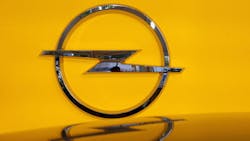Peugeot Owner PSA Explores Acquisition of GM's European Division
PSA Group (IW 1000/55), the maker of Peugeot and Citroen cars, is exploring an acquisition of General Motors Co.’s European business in a deal that would transform the region’s automotive landscape.
The French carmaker is in talks on numerous strategic initiatives, including the possible acquisition of Opel, a PSA spokesman said by phone after Bloomberg reported the talks earlier Tuesday. GM is seeking a multibillion dollar amount for Opel, which also operates U.K. sister brand Vauxhall, because of the outlook for improved operations, according to a person familiar with the matter. Negotiations on valuations are ongoing, the person said.
“I can see why GM may possibly seek to sell its European division, which hasn’t made money in many years,” said George Galliers, an analyst with Evercore ISI. “It is less clear why Peugeot would be interested in buying GM’s assets. The purchase would give them capacity in Germany, one of the most expensive countries to produce cars and would lead to excess capacity.”
A combination would create a manufacturer with about 16% of the European car market, leapfrogging Renault SA to become the region’s second-biggest auto group after Volkswagen AG. A deal would also be the second run at linking the two mass-market carmakers. GM, which has controlled Opel for nearly 90 years, sold a 7% stake in its French counterpart in 2013 after savings from a cooperation fell short of expectations.
PSA shares rose 4.9% to 18.81 euros at 1:04 p.m., valuing the company at 16.3 billion euros (US$17.3 billion). While an agreement could be reached in the coming weeks, negotiations are complex and could still fall apart, said people familiar with the matter, who asked not to be identified because discussions are private.
PSA Desires Volume Boost
PSA is considering the takeover to boost its scale, get access to Opel’s engineering and electric-car technology as well as reap savings from joint purchasing and eventually cost cuts, according to one of the people. For GM, it would mark a clean exit from Europe, especially after the U.K. vote to leave the European Union weighed on the British pound and profits, the person said.
Both carmakers have gone through painful restructuring in recent years. GM, which has lost billions in Europe in the past two decades, closed a factory in Bochum, Germany, the first auto plant to close in the country since World War II, while PSA shuttered a facility in the Paris suburb of Aulnay. While those moves helped ease overcapacity concerns, the two manufacturers largely target similar customers in Europe’s competitive and mature auto market.
Those risks were evident in 2014, when PSA sought a bailout from the French government and China’s Dongfeng Motor Corp., which each hold 14% stakes along with the Peugeot family. Under Chief Executive Officer Carlos Tavares, PSA has returned to profit by focusing on fewer, more lucrative models, while his counterpart Karl-Thomas Neumann, a German auto-industry veteran, has refreshed Opel’s image with models like the stylish Adam city car.
Still, Brexit has added fresh uncertainty for GM in Europe. The company postponed plans to return Opel to break even, citing costs associated with the U.K.’s EU exit. GM’s European operations posted a loss of $257 million in 2016 after a deficit of $813 million the previous year. GM, which has controlled Opel since 1929, has struggled for years to make the unit profitable amid increasing competition from the likes of Hyundai Motor Co. and VW’s Skoda.
In the aftermath of GM’s bankruptcy, the U.S. automaker came close to selling Ruesselsheim-based Opel in 2009, but ultimately kept the unit to ensure a sizable presence in Europe. Opel’s importance increased after GM pulled the Chevrolet brand from Europe, backing off on a planned expansion. Opel’s sales last year rose 2.7% to 1.2 million cars.
By Aaron Kirchfeld, Siddharth Philip, David Welch, Ed Hammond, Ruth David
About the Author
Bloomberg
Licensed content from Bloomberg, copyright 2016.
